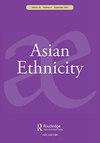Making it work: women, land and labour in West Karbi Anglong, Assam
IF 0.8
Q3 ETHNIC STUDIES
引用次数: 0
Abstract
ABSTRACT The article seeks to understand how the deepening logic of neoliberal governmentality transforms the lives, labour and access to resources such as land, for women in West Karbi Anglong, Assam, Northeast India. It explores new forms of social (in)equality and mobility in gender relations and community dynamics in Sixth Schedule districts, tracing the evolving conjuncture between community, state and the market. We approach this question in two ways: first, how the neoliberal market rationality reconstitutes and is reconstituted by existing customs of inheritance, patterns of labour, notions of community and belonging, and gender relations; second, the strategies that women adopt in a context where forms of women’s work and modes of access to resources such as land are going through rapid changes. The aim is to encourage critical reflections on women’s access/rights to land and their labour in the Sixth Schedule areas, and what changes with the neoliberal turn.阿萨姆邦西Karbi Anglong的妇女、土地和劳动力
本文试图理解新自由主义治理的深化逻辑如何改变印度东北部阿萨姆邦西卡尔比昂格朗妇女的生活、劳动和对土地等资源的获取。它探讨了第六附表地区性别关系和社区动态中的社会平等和流动性的新形式,追踪了社区、国家和市场之间不断发展的联系。我们从两方面探讨这个问题:第一,新自由主义市场理性如何重构现有的继承习俗、劳动模式、社区和归属概念以及性别关系;第二,妇女在妇女的工作形式和取得土地等资源的方式正在经历迅速变化的情况下所采取的战略。其目的是鼓励对妇女在第六附表地区获得土地和劳动的权利进行批判性思考,以及随着新自由主义转向而发生的变化。
本文章由计算机程序翻译,如有差异,请以英文原文为准。
求助全文
约1分钟内获得全文
求助全文
来源期刊

Asian Ethnicity
PHYSIOLOGY-
CiteScore
2.80
自引率
6.20%
发文量
27
期刊介绍:
In the twenty-first century ethnic issues have assumed importance in many parts of the world. Until recently, questions of Asian ethnicity and identity have been treated in a balkanized fashion, with anthropologists, economists, historians, political scientists, sociologists and others publishing their studies in single-discipline journals. Asian Ethnicity provides a cross-disciplinary, international venue for the publication of well-researched articles about ethnic groups and ethnic relations in the half of the world where questions of ethnicity now loom largest. Asian Ethnicity covers any time period, although the greatest focus is expected to be on the twentieth and twenty-first centuries.
 求助内容:
求助内容: 应助结果提醒方式:
应助结果提醒方式:


